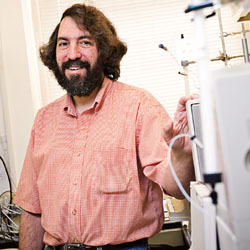Stephen Meredith, Associate Professor in Pathology and the Biological Sciences Collegiate Division
By Kristin O'NeillMedical Center Public Affairs
 Stephen Meredith | |
Stephen Meredith, Associate Professor in Pathology and the Biological Sciences Collegiate Division, who teaches undergraduate students in the Fundamentals program, never abandoned his passion for literature during his academic training in the biological sciences.
His familiarity with James Joyce, Thomas Aquinas and Fyodor Dostoyevsky would later merge with his scientific teaching career at Chicago. A faculty member since 1979, Meredith developed an undergraduate course on literary and philosophical reflections on disease. Popular acclaim from his students brought an invitation to teach other undergraduate courses.
One difference, he notes, between teaching literature and biology is the challenge of dealing with theories about a text, which can come between the student and the material.
“Some theoretical approaches to literature—I am thinking in particular about some of the deconstructionists—seem intent on ripping the text apart, exposing what they think to be its underlying contextual assumption,” Meredith says. “I prefer to exercise what George Steiner called, in Real Presences, ‘cortesia’ towards the text—almost like being courteous to another person who is trying to tell us something,” Meredith says. So he concentrates on the basics. “When I teach Joyce’s Ulysses, students should try to understand Joyce’s Ulysses. When I teach about peptides, they should understand peptides.”
Meredith’s students have taught him a thing or two in the process, he says. “Several times, students have shown me fallacies in my understanding of texts. For example, a student in the Aquinas class, Andrew Varcoe, showed me the error of my ways in how I was describing Aquinas’ theory of human knowledge.
“While it can be embarrassing,” he says of such an incidence, “it’s incredibly useful and important” to learn from one’s students, as well.
As far as teaching methods go, Meredith’s method is in the material. “If you can think clearly about the material, you’ll probably be able to explain it to someone else. If you can’t explain it clearly,” he says, “that probably means you really aren’t thinking about it clearly.”
In addition to teaching undergraduates James Joyce’s Ulysses and the works of Thomas Aquinas, Meredith also teaches St. Augustine’s The City of God (co-taught with Jean Bethke Elshtain, the Laura Spelman Rockefeller Professor in the Divinity School) and Dostoyevsky’s The Brothers Karamazov. Meredith, who was honored in 1994 with a Faculty Award for Excellence in Graduate Teaching, teaches Designer Peptides and Proteins, Biochemistry and Molecular Biology, Cellular Pathology, and Immunology to graduate-level and medical students.
He says he most enjoys teaching the Joyce and Aquinas courses to undergraduates because of “the combination of the really smart, enthusiastic students and fantastic material.” He also enjoys co-teaching with Elshtain. His favorite graduate classes include Designer Peptides because of the “still non-disillusioned interest” of graduate students, most of whom study biochemistry, coupled with their developing skills. “Also, it’s a subject I care a lot about,” Meredith adds.
Meredith’s multidisciplinary academic career began with a B.A. in literature from Brandeis University in 1970, followed by a medical degree from Washington University in 1974. After completing a residency in anatomic pathology at the University Hospitals, he joined the Chicago faculty in 1979, and in 1982, received his Ph.D. in biochemistry from the University.
His own research focuses on protein structure, especially the formation of fibrils, which are involved in neurological diseases such as Alzheimer’s disease.
![[Chronicle]](/images/sidebar_header_oct06.gif)